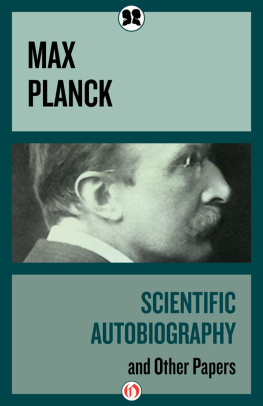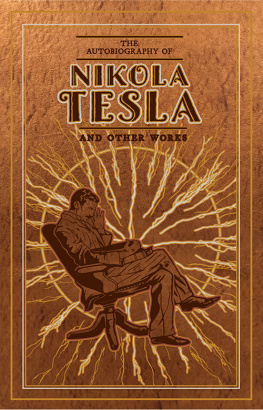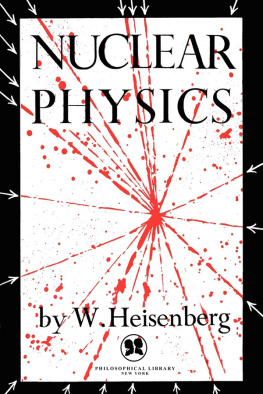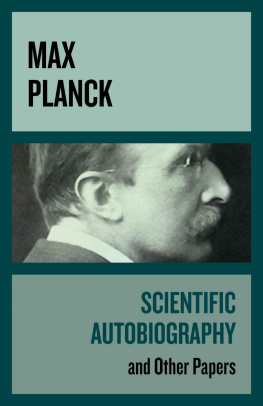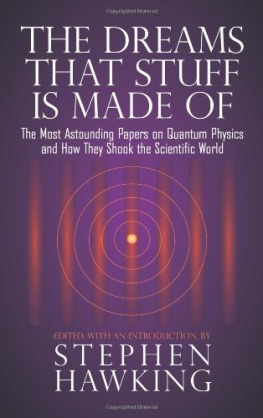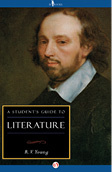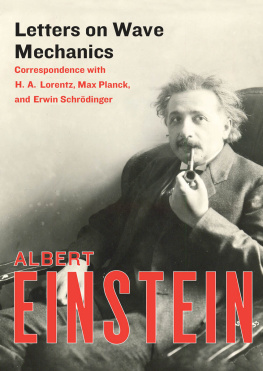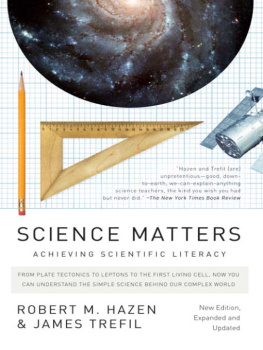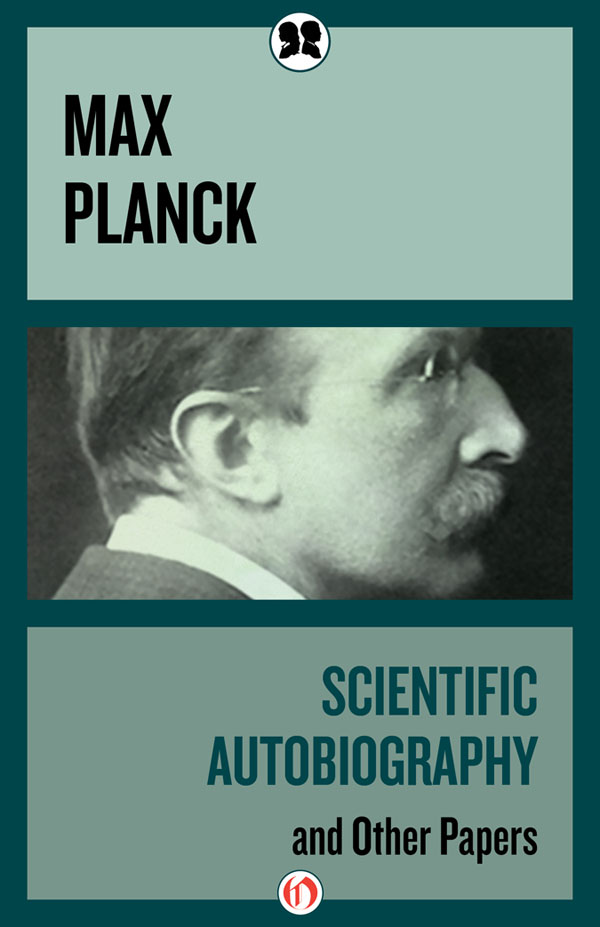A Scientific Autobiography
My original decision to devote myself to science was a direct result of the discovery which has never ceased to fill me with enthusiasm since my early youththe comprehension of the far from obvious fact that the laws of human reasoning coincide with the laws governing the sequences of the impressions we receive from the world about us; that, therefore, pure reasoning can enable man to gain an insight into the mechanism of the latter. In this connection, it is of paramount importance that the outside world is something independent from man, something absolute, and the quest for the laws which apply to this absolute appeared to me as the most sublime scientific pursuit in life.
These views were bolstered and furthered by the excellent instruction which I received, through many years, in the Maximilian-Gymnasium in Munich from my mathematics teacher, Hermann Mller, a middle-aged man with a keen mind and a great sense of humor, a past master at the art of making his pupils visualize and understand the meaning of the laws of physics.
My mind absorbed avidly, like a revelation, the first law I knew to possess absolute, universal validity, independently from all human agency: The principle of the conservation of energy. I shall never forget the graphic story Mller told us, at his raconteurs best, of the bricklayer lifting with great effort a heavy block of stone to the roof of a house. The work he thus performs does not get lost; it remains stored up, perhaps for many years, undiminished and latent in the block of stone, until one day the block is perhaps loosened and drops on the head of some passerby.
After my graduation from the Maximilian-Gymnasium, I attended the University, first in Munich for three years, then in Berlin for another year. I studied experimental physics and mathematics; there were no professorships or classes in theoretical physics as yet. In Munich, I attended the classes of the physicist Ph. von Jolly, and of the mathematicians Ludwig Seidel and Gustav Bauer. I learned a great deal from these three professors, and I still retain them in reverent memory. But I did not realize until I came to Berlin that in matters concerned with science they had really just a local significance, and it was in Berlin that my scientific horizon widened considerably under the guidance of Hermann von Helmholtz and Gustav Kirchhoff, whose pupils had every opportunity to follow their pioneering activities, known and watched all over the world. I must confess that the lectures of these men netted me no perceptible gain. It was obvious that Helmholtz never prepared his lectures properly. He spoke haltingly, and would interrupt his discourse to look for the necessary data in his small note book; moreover, he repeatedly made mistakes in his calculations at the blackboard, and we had the unmistakable impression that the class bored him at least as much as it did us. Eventually, his classes became more and more deserted, and finally they were attended by only three students; I was one of the three, and my friend, the subsequent astronomer Rudolf Lehmann-Filhs, was another.
Kirchhoff was the very opposite. He would always deliver a carefully prepared lecture, with every phrase well balanced and in its proper place. Not a word too few, not one too many. But it would sound like a memorized text, dry and monotonous. We would admire him, but not what he was saying.
Under such circumstances, my only way to quench my thirst for advanced scientific knowledge was to do my own reading on subjects which interested me; of course, these were the subjects relating to the energy principle. One day, I happened to come across the treatises of Rudolf Clausius, whose lucid style and enlightening clarity of reasoning made an enormous impression on me, and I became deeply absorbed in his articles, with an ever increasing enthusiasm. I appreciated especially his exact formulation of the two Laws of Thermodynamics, and the sharp distinction which he was the first to establish between them. Up to that time, as a consequence of the theory that heat is a substance, the universally accepted view had been that the passing of heat from a higher to a lower temperature was analogous to the sinking of a weight from a higher to a lower position, and it was not easy to overcome this mistaken opinion.
Clausius deduced his proof of the Second Law of Thermodynamics from the hypothesis that heat will not pass spontaneously from a colder to a hotter body. But this hypothesis must be supplemented by a clarifying explanation. For it is meant to express not only that heat will not pass directly from a colder into a warmer body, but also that it is impossible to transmit, by any means, heat from a colder into a hotter body without there remaining in nature some change to serve as compensation.
In my endeavor to clarify this point as fully as possible, I discovered a way to express this hypothesis in a form which I considered to be simpler and more convenient, namely: The process of heat conduction cannot be completely reversed by any means. This expresses the same idea as the wording of Clausius, but without requiring an additional clarifying explanation. A process which in no manner can be completely reversed I called a natural one. The term for it in universal use today, is: Irreversible .
Yet, it seems impossible to eradicate an error which arises out of an all too narrow interpretation of Clausius law, an error against which I have fought untiringly all my life. To this very day, instead of the definition I just mentioned, one often finds irreversibility defined as An irreversible process is one which cannot take place in the opposite direction. This formulation is insufficient. For it is quite possible to conceive of a process which cannot take place in the opposite direction but which can in some fashion be completely reversed.
Since the question whether a process is reversible or irreversible depends solely on the nature of the initial state and of the terminal state of the process, but not on the manner in which the process develops, in the case of an irreversible process the terminal state is in a certain sense more important than the initial stateas if, so to speak, Nature preferred it to the latter. I saw a measure of this preference in Clausius entropy; and I found the meaning of the Second Law of Thermodynamics in the principle that in every natural process the sum of the entropies of all bodies involved in the process increases. I worked out these ideas in my doctoral dissertation at the University of Munich, which I completed in 1879.
The effect of my dissertation on the physicists of those days was nil. None of my professors at the University had any understanding for its contents, as I learned for a fact in my conversations with them. They doubtless permitted it to pass as a doctoral dissertation only because they knew me by my other activities in the physical laboratory and in the mathematical seminar. But I found no interest, let alone approval, even among the very physicists who were closely concerned with the topic. Helmholtz probably did not even read my paper at all. Kirchhoff expressly disapproved of its contents, with the comment that the concept of entropy, whose magnitude could be measured by a reversible process only, and therefore was definable, must not be applied to irreversible processes. I did not succeed in reaching Clausius. He did not answer my letters, and I did not find him at home when I tried to see him in person in Bonn. I carried on a correspondence with Carl Neumann, of Leipzig, but it remained totally fruitless.

